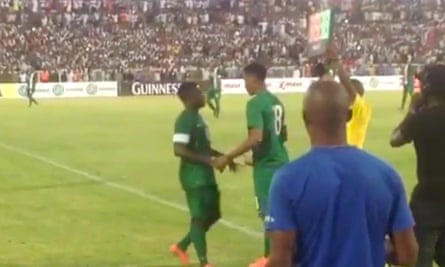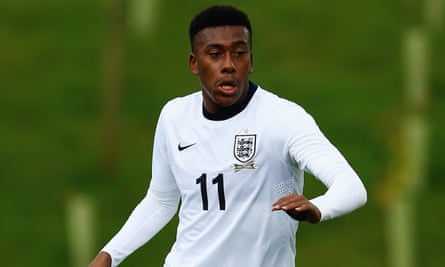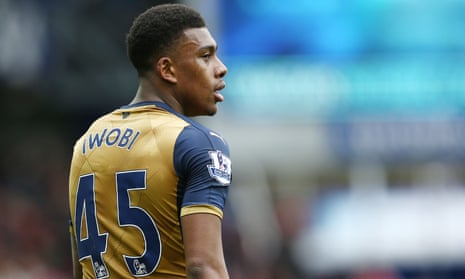Wes Morgan was brought up on the tough, inner-city estate in Nottingham that is misleadingly known as The Meadows and features a pub called the Poets Corner that, with all due respect to the regulars, is not exactly the sort of place you would find anyone reciting Keats.
The Jamaica international duly speaks with the accent of a city where nobody bats an eyelid that “duck” is the de facto term of endearment. He spent the first nine years of his career playing for Nottingham Forest, six in the Championship and three in League One, and when he finally made it into the Premier League with Leicester City he was 30, at a stage in his career when no one could possibly have imagined him developing into the monster of a defender we see today.
“You’ll never beat Wes Morgan,” the song used to go, to the tune of the old Des Walker tribute, and this season he has brought it to the highest level in English football. Strikers do not get around Morgan in the way that, say, Sergio Agüero beat Chris Smalling in the Manchester derby last weekend. Morgan is no longer accident-prone in the way of old. He is captaining the team that are primed to win the Premier League and the people who keep these records tell me he has blocked more shots and made more clearances, interceptions and headers than any of the centre-halves – Gary Cahill, Smalling, John Stones and Phil Jagielka – in Roy Hodgson’s England squad. Last weekend, when Leicester consolidated their position at the top of the table with a third successive 1-0 win, Morgan cleared the ball more times than the entire Crystal Palace defence.
If things had been different it is not entirely ludicrous, therefore, to think Morgan could conceivably have become the third Leicester player, alongside Jamie Vardy and Danny Drinkwater, to have been fitted out for an England shirt. Except, of course, it is hypothetical now. Morgan was so far out of the reckoning that in September 2013 he accepted an invitation from Jamaica instead. The player had a way in through his grandparents and, though he is plainly English, he fancied a shot at international football. England was out of the question so he said yes to Jamaica and on Friday he won his 25th cap in a 1-1 draw against Costa Rica.
It goes that way sometimes and no one can blame the Football Association. Some players are just late bloomers and no one could realistically have imagined it would even be a possibility when Morgan was part of the Forest defence that conceded five goals at home to Yeovil in the League One playoffs. His first season in the top division was a difficult one and nobody was clamouring for the FA to intervene when Jamaica started looking at his family tree.
Unfortunately for the FA, it isn’t quite so easy to understand the logic when it comes to Alex Iwobi of Arsenal, another story of dual nationality issues and a chain of events that throws up some awkward questions about how one of the outstanding young talents in English football has now been lost in the system.
Iwobi is at the other end of his career to Morgan and his performance for Arsenal in their Champions League tie in Barcelona a couple of weeks ago supplied the hard evidence why Arsène Wenger preferred to have the 19‑year‑old in his team at the expense of more established players. The teenager kept his place and scored his first goal for the club in a man‑of‑the‑match display at Everton last weekend. Yes, these are early days, but Iwobi has already shown a level of football sophistication to make observers envisage a rich career.
“He should be playing for England,” Wenger said in January, and he did for a while. Iwobi made seven appearances for England’s under-16s, three for the under-17s and one at under-18 level and, by all accounts, was happily embedded in the setup. But then the invitations stopped.
“He played for the England youth teams for a while but when it came to the under-19s, they didn’t pick him,” Wenger said last weekend, wearing an expression that made it absolutely clear what he thought about it. And now it is too late. Iwobi moved to London at the age of four but he was born in Lagos and on Friday he came on as a substitute in Nigeria’s Africa Cup of Nations qualifier against Egypt. That, for England, is the end of it. Fifa’s rules dictate that once a player has been involved in a competitive fixture he is not allowed to switch countries.

The FA’s explanation is that Aidy Boothroyd, in charge of England’s under-19s, simply preferred other players, as every manager is entitled to, in an age group that is regarded as particularly strong, and that Iwobi preferred Nigeria because he felt more of an emotional attachment to the country of his birth.
You will have to decide for yourself whether that is an entirely satisfactory explanation but it is certainly a different version of events to the one emanating from Arsenal, where they believe it is an oversight on the FA’s part and seem puzzled by the apparent lack of effort to make sure Iwobi knew he was wanted in the way, for example, that happened with Jack Grealish.
Ok, perhaps there is a bit of self-interest here from Wenger when playing for England would mean Iwobi not disappearing mid-season every couple of years for the Africa Cup of Nations. Yet Iwobi said himself in January that he would have “loved” to play for England and it would be intriguing to know why the FA did not try harder to make it happen before Friday’s cutoff point.
Hodgson made a personal intervention to ambush the Republic of Ireland’s plans for Grealish. Iwobi, in stark contrast, appears to have slipped away without anything like the same kind of fight.
It certainly wasn’t a snap judgment on the teenager’s part to look elsewhere given his last appearance for England came at under-18 level in October 2013 and it was almost two years later that he grew tired of waiting, registered with Nigeria and made his first couple of appearances in non-binding friendlies. Iwobi has apparently talked of feeling unwanted by England, though, in fairness to the FA, it did presumably play a part that the player’s uncle is Jay-Jay Okocha, football royalty in Nigeria.

The fact remains, however, that Iwobi was in the England system and the relevant people – through carelessness, poor judgment or not being proactive enough, call it what you will – might come to regret what has happened when there is clearly the potential for him to be an international player for many years. He is already keeping Theo Walcott, a regular of Hodgson’s squads, out of the Arsenal side and it is worth noting the number of players in England’s latest under-19, under-20 and under-21 squads who are contracted to Premier League clubs but, unlike Iwobi, nowhere near the first team, or out on loan at places including Cambridge, Carlisle and Coventry.
One is Ainsley Maitland-Niles, another product of Arsenal’s conveyor belt of young talent, who is on loan at Ipswich and was selected by Boothroyd for the under-19s on Friday. Isaac Hayden, on loan from Arsenal to Hull, was in the under-21s before having to pull out. Both are regarded by Wenger as having rich potential but they are still some way behind Iwobi when you consider Thierry Henry’s assessment of the player England have now lost for good. “Alex wasn’t scared against the best team in the world in Camp Nou,” Henry said. “He was brave on the ball, calm in and around the penalty area and justified all the work invested in him by the academy. He works hard, he listens. He is the perfect example of how a kid has to behave to make it to the top.”
At the same time, the FA has been working behind the scenes to win over Rolando Aarons, a Jamaica-born player on the fringes of the Newcastle first team who has similar dual nationality issues to Iwobi and has just received his first call-up to England Under-21s. You win some, you lose some. It is just a shame, perhaps, for England that they might have passed up one of the more obviously talented young players in the system, and that so many people involved in the process appear to have looked the other way.
Awkward silence
The outpouring of emotion since Johan Cruyff’s death and some beautifully written tributes over the past few days have captured his place in the sport and it is only right that the Football Association mark what has happened before England’s game against the Dutch on Tuesday.
Equally, I hope it doesn’t sound disrespectful in any way to express a wish that Holland’s decision to interrupt their game for a minute’s silence against France on Friday, rather than holding the tribute before the match, does not catch on elsewhere in the future.
Something special had to be done to recognise Cruyff’s unique position in Dutch football but what I am talking about here – and I appreciate it is a sensitive subject – is the practice of minute’s silences in general. It feels unfair on the players to expect them to switch on and off in the midst of a match and it is reassuring to hear that the football authorities in England are not keen on the idea either.
An odd U21 snub
That was a curious reason Gareth Southgate offered for Marcus Rashford not making it into the England Under-21s squad. Rashford was restricted to a place in the under-20s because, according to Southgate, it was important to “take a little bit of the heat away” from a player who has scored five goals in his first eight games for Manchester United. “He is a player we are very aware of from the younger age groups but it was a bit early for him, exposure-wise, to be with the under-21s,” the manager explained.
Let’s just walk through that one again. In the past five weeks, Rashford has played against Arsenal, Liverpool (twice) and scored the winner in the Manchester derby, subjecting Martín Demichelis to such a chasing that it would be surprising if a player who has appeared in World Cup and Champions League finals ever features in the Premier League again. Rashford is standing in for Wayne Rooney and only a few weeks younger than Michael Owen was at France 98. But it would have been too much for him to face Switzerland’s Under-21s at the 10,000-capacity Stockhorn Arena, home of mighty FC Thun?

